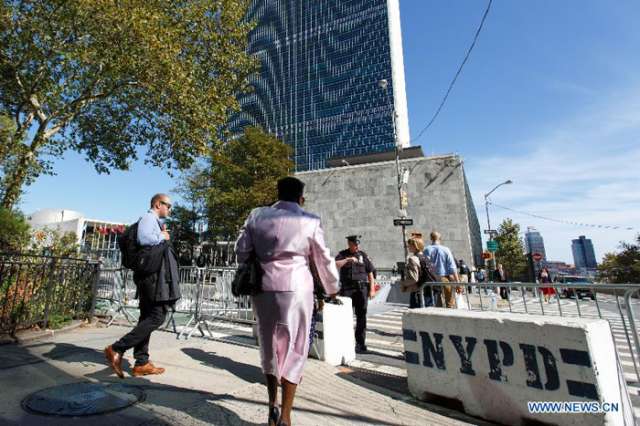Law enforcement officers galore greet all arriving at UN headquarters in New York for the 70th anniversary celebrations and annual high-level debate in the UN General Assembly, preceded this year by a sustainability summit of about 150 world leaders which kicks off here Friday.
With the host country of the United Nations -- the United States -- responsible for protection of the United Nations, officers from federal, city and state agencies back up the lead of the U.S. Secret Service (USSS) -- charged with protecting U.S. presidents and visiting heads of state -- and the New York Police Department (NYPD), doing the heavy lifting, literally.
Speaking into microphones on the green marble rostrum in the great hall of the 193-member General Assembly will be a lengthy list of heads of state and government that includes the Chinese Presidents Xi Jinping, French President Francois Hollande, Russian President Vladimir Putin and U.S. President Barack Obama. Prime Minister David Cameron of Britain will also take the floor.
It means all five permanent members of the 15-nation UN Security Council will be represented at the highest levels. They are among the more than 8,900 delegates registered to attend the summit and General Debate, UN officials said.
The security ring for them and all others is exceptionally tight around the seven-hectare (70,000-square-meter) UN complex on the east side of Midtown Manhattan in New York City.
The United Nations said it expects leaders of about 170 of the world organization.
Gray metal crowd-control barricades line city streets near UN headquarters. They were put in place the last few days by casually-dressed police officers, some wearing their silver- or gold-colored NYPD shields. They don`t like to call them badges.
These barricades squeeze sidewalks while huge ton-weight blocks of white-painted concrete, emblazoned NYPD in blue, squeeze traffic on streets near and in front of the UN complex, channeling arriving VIP motorcades to go over a moving steel gate that tilts from the near vertical to flat horizontal. On many of the devices when it is up, "S T O P" is spelled out.
City Department of Sanitation trucks used for salting and sanding icy roads in the winter also take up positions blocking roadways further out from the moveable gates, going forward or reverse all day to let in, or out, authorized vehicles.
Pedestrians are stopped too, in most cases like vehicles a long city block away from headquarters and have to show their accreditation before being allowed through the initial security perimeter. Accreditation from the UN is required for entering the campus, along the First Avenue.
Fire Department of New York (FDNY) Emergency Medical Service (EMS) ambulances take up stations in the traffic circle in front of the 39-story Secretariat adjacent to the iconic General Assembly building with its concave roof.
The usual FDNY pumping and ladder trucks are parked nearby along with the more specialized hazardous material, rescue and other emergency units.
The NYPD samples air quality and monitors wind direction to detect any possible air-borne toxic chemicals. Radiation detectors also are among the NYPD`s bag of tools.
Last week all the agencies held a drill overseen from a vast room lined with large video displays -- akin to a war room -- were different terrorist scenarios were played out and responses directed and measured.
Various-sized vessels from the NYPD and the U.S. Coast Guard patrol the East River, which forms the eastern border of the campus, while exit and entrance ramps from the Franklin D. Roosevelt (FDR) Drive paralleling the river and going under the UN`s eastern esplanade have been closed during the meetings. The drive itself will stay open. Trucks are not allowed on the expressway.
Rooftop and other high-level observation posts have been established in the neighborhood in addition to surveillance and command helicopters buzzing overhead.
Special traffic lanes are set up on a few arterial streets, like 42nd Street, heading to the United Nations for VIP motorcades and construction sites along those routes that had been taking up a traffic lane or two have been shut down for days of speechifying.
Residents and businesses suffer the inconvenience of blocked deliveries to them, not to mention that people have to establish that they actually live or work in buildings when approaching near the UN compound.
But most have learned to cope. A very few businesses close some of the more intense days and even some residents have been known to leave town to avoid the security hassles.
Opinions on the opus vary from suggesting the world organization move to another city to welcomes for the increased security and drama of it all.
King Yu, the energetic owner of a very popular but small Chinese restaurant within the security cordon on East 45th Street, is one who enthusiastically welcomes the yearly spectacle.
When asked by Xinhua how business is, he replied with a big smile, "Good."
He explained that people who live and work nearby come in more frequently.
"Once the meetings start, actually business is a lot better than the normal time," the restaurateur explained. "Because they are within the security perimeter and people don`t want to go too far and would have to come back through the checkpoints."
While his outgoing deliveries have problems, Yu said, "We`ve been in business for years already and customers know how difficult it is going through the checkpoints."
An added bonus, he said, was that a lot of security personnel come to eat. "Every year we see the same faces," Yu said. "They are all nice people but, pretty serious."
More about:















































